Has blame shifting become a regular part of your life, making its way into every conversation and argument? ”I wouldn’t have cheated on you if you hadn’t nagged me so much!” ”I would stop getting angry if you stopped getting upset about everything.” “I would not have done this if you wouldn’t have done that.”
Are these statements incessantly recurring in your relationship? Do you feel like no matter what you do, something is always lacking, and you are the only one blamed for it? If the answer to these questions is yes, you are a victim of blame shifting in marriage. Being blamed for everything in a relationship is often a way to exert control over one’s partner and can lead to severe emotional turmoil in a relationship. Emotional abuse and blame shifting go hand in hand.
Psychotherapist Gopa Khan (Masters in Counseling Psychology, M.Ed), who specializes in marriage and family counseling, gives us a breakdown of what constitutes blame shifting, blame shifting examples, its roots, and how to deal with blame shifting on the whole.
What Is Blame Shifting?
Table of Contents
Gopa says, ”In psychology, we have a concept called ‘locus of control’. In life, we can either choose to have an internal locus of control or an external locus of control. What it simply means is that folks who choose to have an internal locus of control are more likely to take responsibility for their actions, behavior, and their perspective in life.”
She adds, ”A person who chooses to have an internal locus of control will not shift blame or hold other people responsible for their actions. A person with an external locus of control, however, chooses to blame and make scapegoats of their loved ones for their own unhappiness and failures. This concept is important as when partners are blamed for their ‘faults’, it leads to them being brainwashed into thinking they are responsible for all the wrongs in their relationship and that they need to bend over backward to help rescue the relationship.”
The abusers in the blame shifting game do not take responsibility for their actions. They are often emotionally immature, lack emotional intelligence, and exhibit escapist behavior. Whatever happens, they are always a victim, and it’s always someone else’s fault. These are all blame shifting examples.
An acute level of blame shifting can lead to emotional abuse, domestic abuse, and mental harassment. It is even more disturbing to observe that the victims of these blame games start believing the accusations of the abusers, and put in even more futile hard work to make the relationship better. And this, in turn, encourages the abuser even further.
The Psychology Behind Blame-Shifting
Generally, the behavior of blame shifting arises from one’s own internalized feeling of failure. Often, when people think of themselves as not good enough for their significant others, they feel emotions of inability, incapability, or irresponsibility.
Rather than realizing this pattern and bringing a change in their behavior, they begin blaming their partners for everything going wrong in their life. This could be seen as an attempt for them to feel better about themselves, or to break the confidence of their partners.
”Blame shifting in most abusive relationships is quite common”, says Gopa, adding, “Abusers thrive on power and control, which helps them manipulate their partners and thus, it becomes easier for them to shift blame. These people have an external locus of control and refuse to take responsibility for their behaviors and actions. In fact, they are often enabled by their family members, thus the behavior continues much to the detriment of the relationship and family environment.
“A female client of mine in such a relationship was blamed for her husband’s non-functional career and her in-laws acted as enablers to appeal to the wife to often forgive him or “apologize to maintain family peace”. Thus, the wife also became an enabler.” Blame shifting in marriage is very much a reality, and often, women are expected to remain silent despite the abuse, just to keep the peace. Worse, they often end up blaming themselves because of all the projection and blame coming their way.
The roots of blame shifting can be traced back to the abuser’s childhood. Growing up in an unhealthy environment of ceaseless arguments can lead to poor self-esteem, and the abuser ends up blaming everyone for everything. It’s a type of coping mechanism often developed at a young age and the abuser might not be even doing it intentionally.
8 Ways Blame-Shifting Is Affecting Your Relationship
Relentless blame-shifting psychology can affect a romantic bond severely. It can lead to fights, low self-esteem, and even depression that can destroy a relationship. You are caught in a vicious cycle of emotional abuse as you are internalizing being blamed for everything in a relationship. If you can identify with any or all of the signs listed below, then it’s time to take control and take back your power. Let’s understand blame-shifting psychology by learning how to deal with blame shifting. Read on!
1. You are certain everything is your fault

The blame game of your partner is so strong that you are certain everything that goes wrong in your or their life is your fault. You feel yourself to be more powerless than ever. The pro-activeness you once had to make things better in your relationship has dwindled and you blame yourself for making so many ‘mistakes’ and not correcting them.
“To ensure one does not indulge in blame shifting, whether you are a perpetrator or a victim, it is important to understand whether you are embracing internal or external locus of control and start working on it,” Gopa explains. “An abuser can choose to then change their behavior and learn to take responsibility for their actions. The person on the receiving end can also choose to be empowered and decide not to take responsibility for an abuser’s behavior or actions.
“Once a person chooses to opt out of being a victim, they can then take empowered decisions. This is one way to respond to blame shifting. Often, an abuser is unlikely to change their behavior and then the victim has to break the vicious circle and take steps to either maintain firm relationship boundaries or walk out of the relationship.”
In other words, build up your self-respect and ensure your dignity is not lost. Do not place your relationship above your own peace of mind and self-esteem. At the end of the day, your sanity and mental health are way more important than your relationship with this person. Create a healthy space for you in the relationship and if it’s not possible, bring it to a close.
2. You’re afraid to make any decisions
You’re constantly afraid that any step you take will be seen as another mistake by your partner. For the same reason, you find yourself unable to make decisions anymore. These decisions could be as small as buying a new item or as big as communicating a problem with your partner. The certainty of being blamed for every single thing has rendered you fearful, tired, and in some severe cases, terrified.
Very frequently, you find yourself listless, not doing anything, to avoid another episode of emotional abuse. This is because your confidence has fallen to such low levels that you find yourself unable to make the simplest of decisions or perform the easiest of actions. This can also reflect in your work life over time.
“A person in such a relationship loses the confidence to make decisions and tends to second-guess everything. It is helpful then for the person to maintain a journal and write down thoughts, feelings, and incidents. Writing is cathartic and helps to process traumatic events in a clear manner,” Gopa says.
She adds, “Also, it helps to write down pros and cons while making decisions. The more the cons, the better you realize what decision to take in a relationship. Usually in such relationships, one does not trust one’s own judgment and is swayed by the ‘dominant’ partner. Journaling and having a good support system can help deal with blame shifting.”
By penning down and organizing everything, you allow yourself the luxury of making better decisions. Once all your thoughts are on paper, it becomes much easier to think clearly and sort out things. Try not to let all your jumbled thoughts remain inside your brain and write them down in order to process them systematically.
3. The communication gap is broader than ever
A healthy relationship provides a safe space for a person to share their insecurities and have a healthy conversation about the problems in their relationship. However, in your case, an attempt to discuss your relationship issues directly results in a verbal vomit of how everything is your fault and how if you hadn’t done something, your partner wouldn’t have behaved badly.
You are extremely familiar with the blame-shifting narrative, and as a result, you have stopped communicating your problems to your partner. The communication gap is becoming broader and broader, but there’s nothing you can do to alter that since you’re only going to be blamed more in return.
“Communication problems occur when one person is scared to voice an opinion or decision as they fear ridicule or being shot down with derision. The partner may not want to rock the boat or trigger an argument and hence, prefers to stay silent and be browbeaten into submission,” Gopa explains.
She adds, “The best solution in such a situation is to use ‘I’ statements, such as “I feel hurt when you put me down or choose not to take my suggestions into consideration”. An ‘I’ statement implies taking personal control, and stating one’s feelings helps to empower the person. No one should contradict you and tell you that you should not feel hurt. Stating this directly communicates to your partner how you feel and empowers you to own your feelings. It’s a good way to respond to blame shifting.”
In other words, by using statements that focus on you and your feelings, you take the situation into your hands and are able to deal with it better. By avoiding ‘you’ statements, you don’t let your partner shift the blame and invalidate your emotions. This helps in a more direct form of communication which is difficult to avoid.
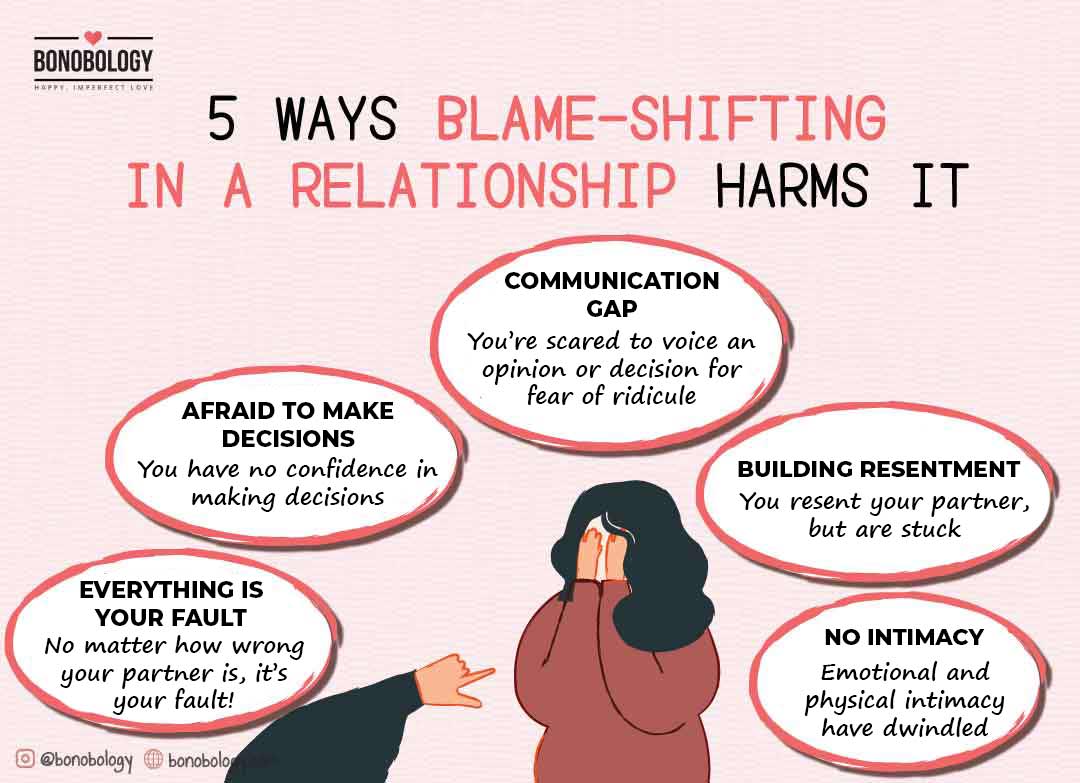
4. You feel resentment toward your partner
There is no space for respect in your relationship. You avoid going home or talking to your partner. If you feel a sense of anger every time you think about your partner, it is proof that blame shifting has affected your relationship and you are building resentment in the relationship toward your significant other.
Related Reading: How To Save A Relationship?
Irritability, dread, tiredness, etc. are all signs that you are resentful toward your partner and rightly so. Nobody can take incessant blame and always be the victim. Not everything can be your fault. You realize that you are unnecessarily being blamed for your partner’s angry outbursts and the thought of being with them makes you bitter. This also means that your relationship is heading toward a breach. Blame shifting in marriage frays the bond a couple shares, and can affect other members of the family too.
5. Intimacy is a lost concept in your relationship
Do you feel the need to be intimate, but you do not want intimacy with your partner? If yes, that is a clear sign that the blame shifting of the abuser is affecting your relationship in a way that cannot be altered. When you’re dealing with cheaters and blame shifting in your relationship, this is bound to happen at one point or another.
Surely you wouldn’t want to be intimate with a person who constantly blames you for everything. You distance yourself from your partner and avoid entering the bedroom when they are in there. You do not know how to be intimate with your partner anymore, for a wrong move in bed would also be your fault. Save yourself from a loveless marriage before the abuser of blame shifting ruins your life.
“When one person feels targeted in a relationship, the first thing to go is the physical aspect. When couples tell me that the physical aspect of their relationship is not there or they are not feeling emotionally connected to their partners, it indicates that the relationship is getting affected. Thus, unless the root cause of the issue is resolved, the lack of intimacy will continue,” Gopa says.
6. You feel suffocated
Having an abusive partner means you can’t open up to them. This leads to you hiding things from them at every stage of your life. And when you start bottling up your emotions, a feeling of suffocation creeps in. One of the major blame shifting examples in relationships is your partner making you feel guilty for everything, which causes you to keep everything to yourself and suffer in silence.
The other person’s ego keeps them from accepting any of their mistakes and it always leads to them shifting the blame away from themselves. By constantly dismissing any of their issues, they gaslight you and force you to stop conveying your issues in the first place. At the end of the day, you need some sanity and peace of mind. And to achieve that, you stop confronting your partner altogether.
Related Reading: A successful marriage needs not fleeting love, but lasting respect
This creates several fissures in your relationship and also adversely affects your mental health. You also stop sharing any of your general thoughts with your partner. All of this can lead up to major arguments or fights which can bring the relationship to an end. It’s best, therefore, to have an open conversation about it and try to fix it. And if that doesn’t work, you should try and seek external help. It can include your relatives, friends, or counselors, anyone who can help resolve your conflicts and whom both of you would listen to.
7. There are regular conflicts
Because blame shifting doesn’t lead to any resolutions or meaningful conversations, all it does is delay miscommunication or disagreements. The same fights happen over and over again and the relationship turns bitter and toxic. This widens the communication gap with your partner and brings resentment into your relationship. This can cause you to cut off from everything and feel lonely.
When a mistake is sidelined by blame shifting instead of being rectified, it creates inaction. This doesn’t allow your relationship to grow forth and prevents your partner’s personal growth too. Regular conflicts are one of the major blame shifting examples and can lead to deterioration of your mental health.
“Invariably, such relationships do hit a roadblock. It is best to seek individual or couple’s counseling, as resentment and contempt are key factors in ruining a relationship. In case of constant and continued resentment, it is best to address it and resolve issues,” advises Gopa.
8. You start accepting abusive behavior

This usually takes place at a later part of a relationship, and could even involve cheaters and blame shifting. This happens after a cycle of similar behavior that you come to accept over time. By undermining your dignity and self-respect over and over again, your partner starts getting away with their blame-shifting psychology, even when they have not been loyal to you. As you lose more and more confidence with time, the easier it becomes to abuse your mental health and not face any repercussions for it.
Only by confronting their blame shifting behavior can you ensure this doesn’t happen to you again. By keeping this conversation away for later, or hoping they will improve with time, you only encourage their blame-shifting psychology. They begin to think they can get away with their problematic behavior every time and, hence, keep repeating it.
Of course, there are ways you can make things better in your relationship and avoid the blame-shifting chronicle, but if your significant other is simply unable to have a sensible insight of their faults and you consistently continue to be the target of their fury, step away from that relationship.
Blame shifting and emotional abuse stand close together, and an abuser is less likely to make a change in their behavior. A relationship full of blame games is an unhealthy relationship that you need to get out of immediately.
Silent Treatment In A Relationship: Is It Abuse And How To Deal
Your contribution does not constitute a charitable donation. It will allow Bonobology to continue bringing you new and up-to-date information in our pursuit of helping anyone in the world to learn how to do anything.




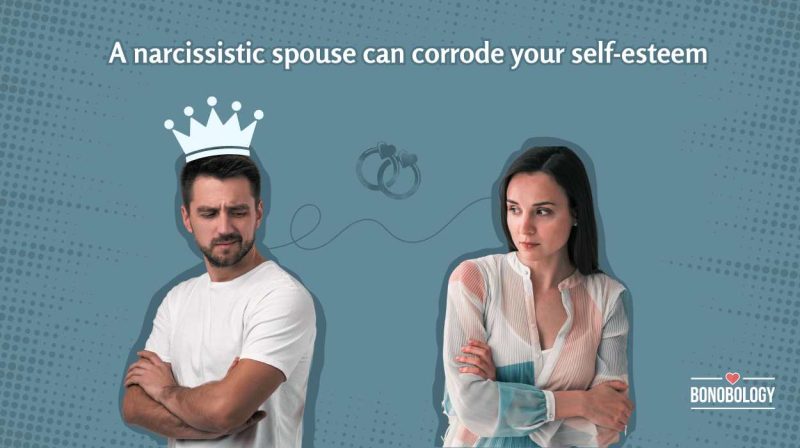
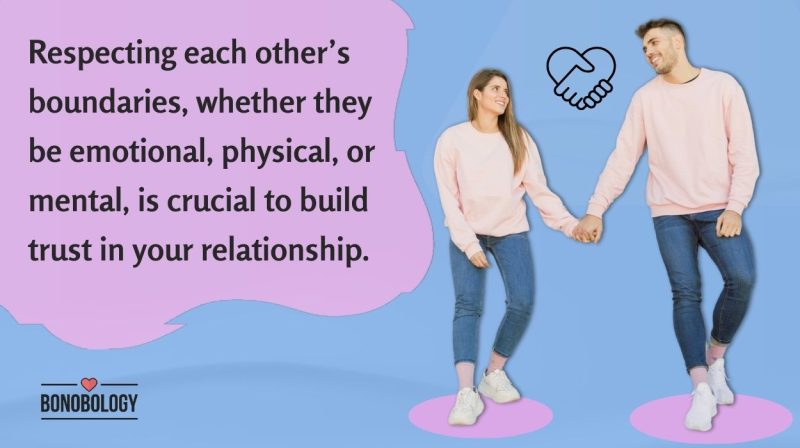



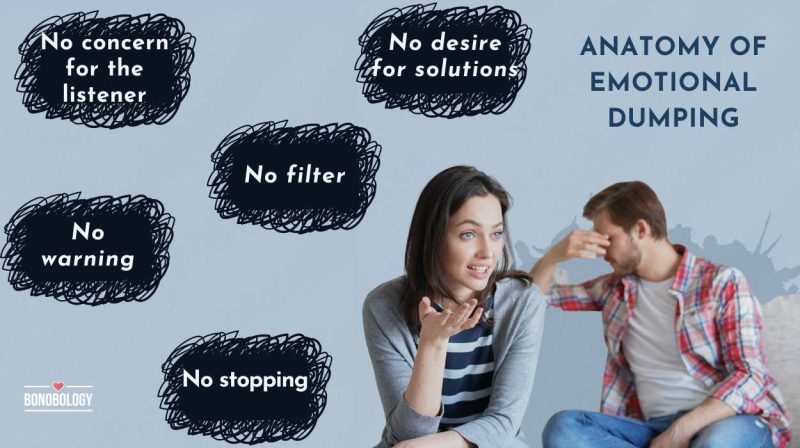






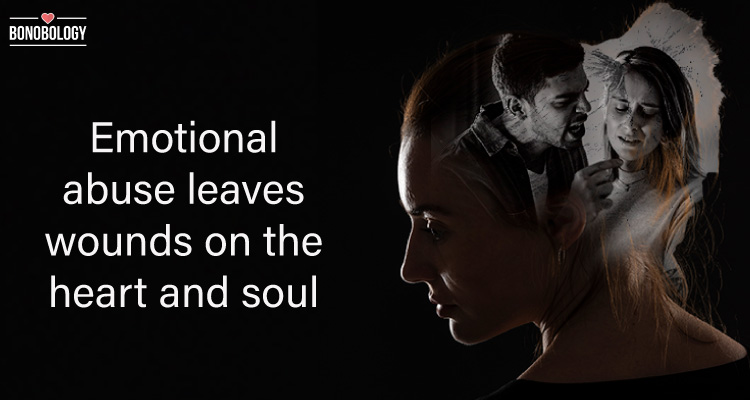
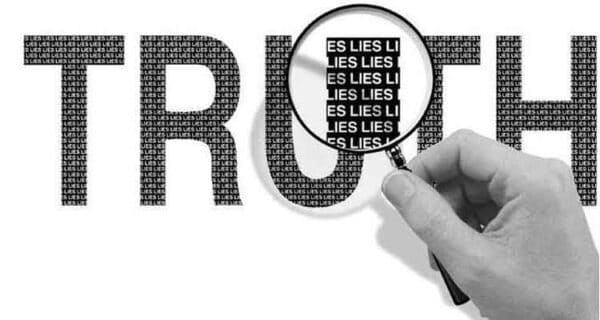

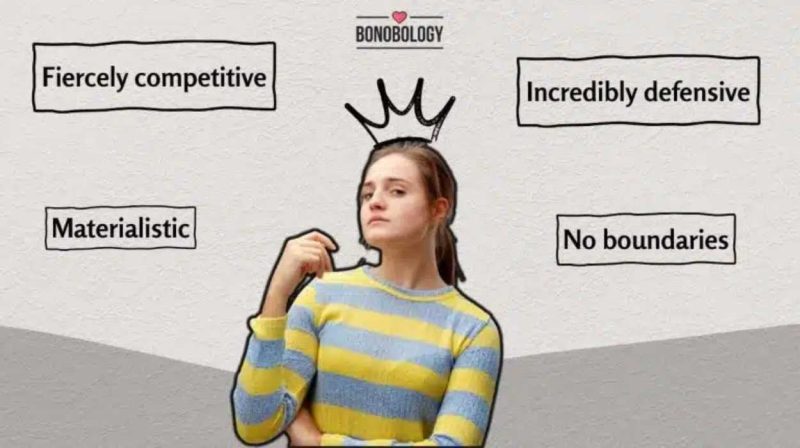
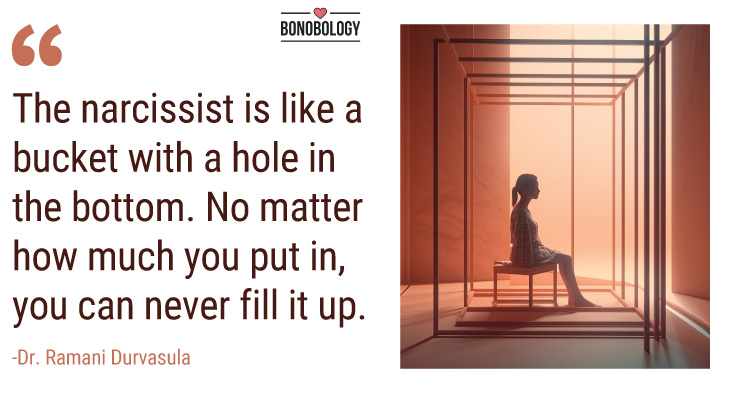

i really love this site man so many good articles thank you